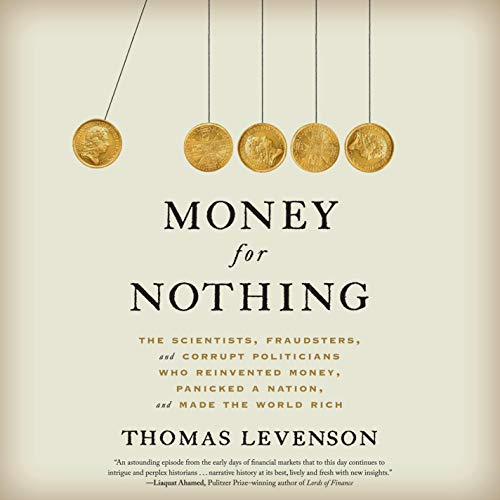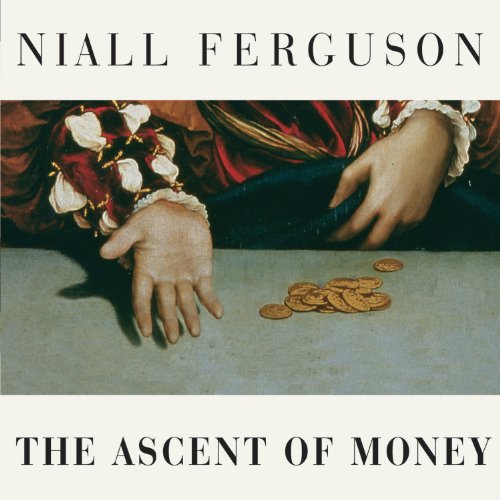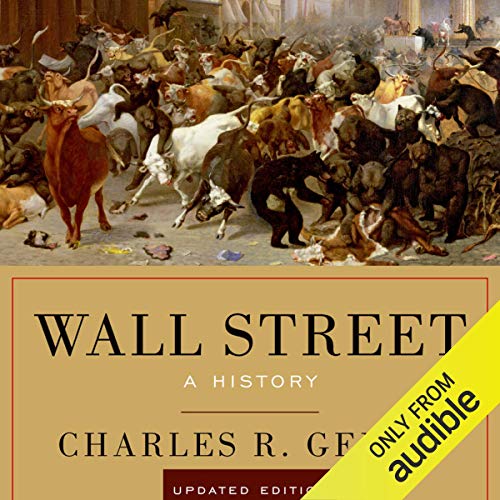
 Audible sample
Audible sample  Playing...
Playing... 
 Paused
Paused  Your audiobook is waiting!
Your audiobook is waiting!
Enjoy a free trial on us
$0.00$0.00
- Click above for unlimited listening to select audiobooks, Audible Originals, and podcasts.
- One credit a month to pick any title from our entire premium selection — yours to keep (you'll use your first credit now).
- You will get an email reminder before your trial ends.
- $14.95$14.95 a month after 30 days. Cancel online anytime.
Buy
-12% $17.72$17.72
Money for Nothing: The Scientists, Fraudsters, and Corrupt Politicians Who Reinvented Money, Panicked a Nation, and Made the World Rich
 Audible Audiobook
– Unabridged
Audible Audiobook
– Unabridged
The sweeping story of the world’s first financial crisis: “an astounding episode from the early days of financial markets that to this day continues to intrigue and perplex historians ... narrative history at its best, lively and fresh with new insights” (Liaquat Ahamed, Pulitzer Prize-winning author of Lords of Finance)
A Financial Times Economics Book of the Year ● Longlisted for the Financial Times/McKinsey Business Book of the Year Award
In the heart of the Scientific Revolution, when new theories promised to explain the affairs of the universe, Britain was broke, facing a mountain of debt accumulated in war after war it could not afford. But that same Scientific Revolution - the kind of thinking that helped Isaac Newton solve the mysteries of the cosmos - would soon lead clever, if not always scrupulous, men to try to figure a way out of Britain’s financial troubles.
Enter the upstart leaders of the South Sea Company. In 1719, they laid out a grand plan to swap citizens’ shares of the nation’s debt for company stock, removing the burden from the state and making South Sea’s directors a fortune in the process. Everybody would win. The king’s ministers took the bait - and everybody did win. Far too much, far too fast. The following crash came suddenly in a rush of scandal, jail, suicide, and ruin. But thanks to Britain’s leader, Robert Walpole, the kingdom found its way through to emerge with the first truly modern, reliable, and stable financial exchange.
Thomas Levenson’s Money for Nothing tells the unbelievable story of the South Sea Bubble with all the exuberance, folly, and the catastrophe of an event whose impact can still be felt today.
- Listening Length12 hours and 12 minutes
- Audible release dateAugust 18, 2020
- LanguageEnglish
- ASINB085ZRNMLW
- VersionUnabridged
- Program TypeAudiobook
 Read & Listen
Read & Listen
Get the Audible audiobook for the reduced price of $12.99 after you buy the Kindle book.
People who viewed this also viewed
- Audible Audiobook
- Audible Audiobook
- Audible Audiobook
- Audible Audiobook
- Audible Audiobook
People who bought this also bought
- Audible Audiobook
- Audible Audiobook
- Audible Audiobook
- Audible Audiobook
- Audible Audiobook
Related to this topic
- Audible Audiobook
- Audible Audiobook
- Audible Audiobook
- Audible Audiobook
- Audible Audiobook
Product details
| Listening Length | 12 hours and 12 minutes |
|---|---|
| Author | Thomas Levenson |
| Narrator | Dan Bittner |
| Whispersync for Voice | Ready |
| Audible.com Release Date | August 18, 2020 |
| Publisher | Random House Audio |
| Program Type | Audiobook |
| Version | Unabridged |
| Language | English |
| ASIN | B085ZRNMLW |
| Best Sellers Rank | #73,468 in Audible Books & Originals (See Top 100 in Audible Books & Originals) #100 in History of Science #112 in Economic History (Audible Books & Originals) #190 in Great Britain History (Audible Books & Originals) |
Customer reviews
Customer Reviews, including Product Star Ratings help customers to learn more about the product and decide whether it is the right product for them.
To calculate the overall star rating and percentage breakdown by star, we don’t use a simple average. Instead, our system considers things like how recent a review is and if the reviewer bought the item on Amazon. It also analyzed reviews to verify trustworthiness.
Learn more how customers reviews work on Amazon-
Top reviews
Top reviews from the United States
There was a problem filtering reviews right now. Please try again later.
This book traces a critical change in financing war and empire to the turning of science to analyzable mathematical abstraction, which then influenced how money was viewed on both sides of the Channel. Both the UK and France turned debt into assets - really, the payment streams from debt into quantifiable assets. Both nations had resulting financial bubbles that burst in 1720. France's government returned to its older revenue-generation schemes, for example privatizing tax collection, which was stable but not flexible. Even after the UK's South Sea Company stock bubble burst, bankrupting many investors, the UK held onto its new liquid exchange for trading those promised payment streams. That gave the government ready access to debt at interest rates that could adjust to new conditions and risks.
The South Sea Company had contemporaneous critics who analyzed and criticized as unsupportable its vast growth in stock value against its revenue streams. Yet Isaac Newton, easily the best mathematician in Britain, lost money, and the critics' math didn't stop the psychology that made bubble look solid to many normally astute investors. Until it wasn't solid any more, and there was nothing to stop the bursting.
Sounds like 2008, huh? There will always be greedheads. How to keep them from crashing the economy like the speculative bandits they are remains an open question. Because they'll always be using every financial innovation to slice themselves the biggest piece of the pie.
With US markets at record highs, Tesla stock rallying from ca. $100 to $800 over a year, and Bitcoin at ca. $40k, this book is an excellent reminder that:
1) when something is too good to be true - it might be a bubble
2) when financial engineering is way beyond the level of comprehension of an individual investor - it might be a bubble
3) when irrational exuberance takes over, and even well-informed investors flock to the market in the fear of missing out on what they fully understand is a speculation - it might be a bubble.
Very much worth it for students of Financial history


















